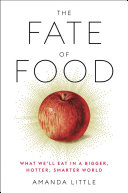2018 School Spending Survey Report
The Fate of Food: What We’ll Eat in a Bigger, Hotter, Smarter World
Harmony: Crown.
Jun. 2019.
352p.
illus. notes. index.
ISBN 9780804189033. $27; ebk. ISBN 9780804189057.
SOC SCI
COPY ISBN
VERDICT An informative, highly recommended read that touches on every relevant area of the subject and will have wide appeal
RELATED
ALREADY A SUBSCRIBER? LOG IN
We are currently offering this content for free. Sign up now to activate your personal profile, where you can save articles for future viewing




Comment Policy:
Comment should not be empty !!!